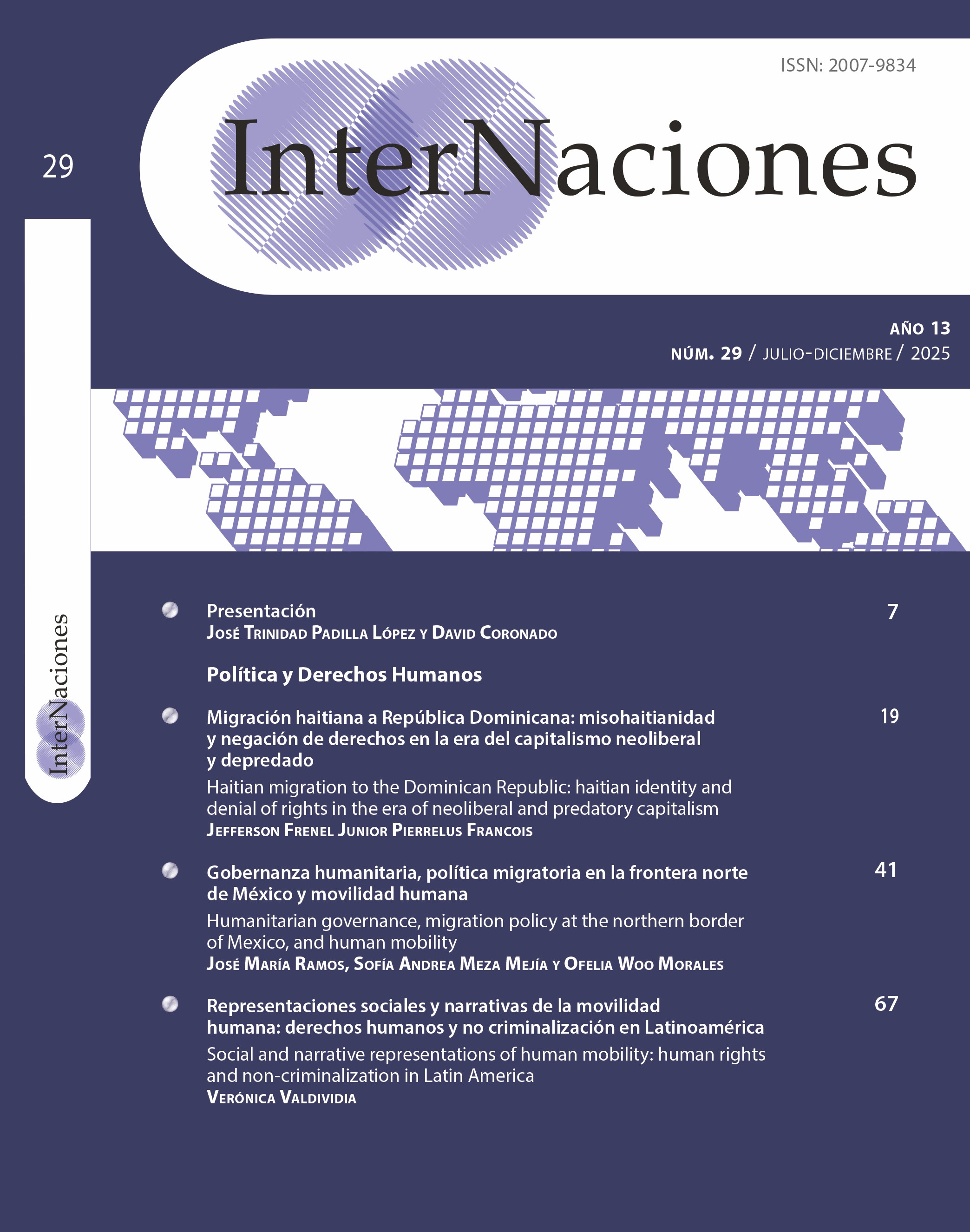Social and narrative representations of human mobility: human rights and non-criminalization in Latin America
DOI:
https://doi.org/10.32870/in.vi29.7308Keywords:
Social representations, human mobility, estructural inequality, migratory narratives, human rightsAbstract
This article examines social representations related to human mobility in Mexico and Latin America, analyzing their role in legitimizing structural inequalities and constructing dehumanizing migration narratives. From an interdisciplinary perspective, grounded in Serge Moscovici’s social psychology and the critical theories of Pierre Bourdieu, Stuart Hall, and David Campbell, this study explores how these representations shape collective imaginaries that reinforce marginalization processes and justify restrictive public policies.The analysis highlights that dominant narratives associate migrants with social and economic threats, contributing to the dispossession of agency and dignity while reinforcing structural inequalities. These representations consolidate power hierarchies and symbolic violence, making the structural causes of migration—such as economic precariousness, environmental degradation, and armed conflicts—invisible. By examining specific cases related to border militarization and the dismantling of migrant caravans, this research demonstrates the impact of these discourses on the formulation of policies that prioritize control over human rights.The proposed approach seeks to redefine these narratives by focusing on empathy and dignity, emphasizing integrative measures similar to those implemented in Canada, which have transformed collective imaginaries and fostered social cohesion. Furthermore, this study explores the connection between academic and political debates on human mobility, providing theoretical and practical tools to redesign public actions that ensure justice and integration.Downloads
References
ACNUR. (2023). Derechos humanos y migración forzada: Reporte anual. Recuperado de https://www.acnur.org.
BBC Mundo. (2024). México intensifica controles migratorios: Presión de Estados Unidos y desafíos internos. Recuperado de https://www.bbc.com/mundo/noticias-america-latina-12345678.
Bourdieu, P. (1991). Language and symbolic power. Harvard University Press.
Campbell, D. (1998). Writing security: United States foreign policy and the politics of identity. University of Minnesota Press.
Calcuta, T. (1985). Un camino sencillo: Reflexiones sobre la vida y el servicio. Harper & Row.
Castles, S. (2003). Towards a sociology of forced migration and social transformation. Sociology, 37(1), 13-34. https://doi.org/10.1177/0038038503037001384.
Chavez, L. R. (2013). The Latino threat: Constructing immigrants, citizens, and the nation. Stanford University Press.
Domínguez-Mujica, J., Guerra-Talavera, R., & Parreño-Castellano, J. (2020). Políticas de movilidad en las Américas: Migración, control y contención. Migraciones Internacionales, 11(1), 1-25. https://doi.org/10.33679/rmi.v1i1.1234.
El País. (2024). Trump refuerza su discurso antiinmigrante: Propuestas y promesas de su mandato. Recuperado de https://elpais.com/internacional/2024-01-01/trump-discurso-antiinmigrante.html.
Gandhi, M. (1947). Autobiografía: La historia de mis experimentos con la verdad. Navajivan Publishing House.
Hall, S. (1997). Representation: Cultural representations and signifying practices. Sage.
HuffPost España. (2024). Medidas migratorias en Estados Unidos: Las políticas de Trump y su impacto. Recuperado de https://www.huffpost.com.
Jodelet, D. (1988). Representaciones sociales: Un dominio en expansión. Psicología Social y Representaciones, 6(3), 485-502.
Moscovici, S. (1979). Psicoanálisis, su imagen y su público. Editorial Huemul.
Moscovici, S. (1984). The phenomenon of social representations. En R. Farr & S. Moscovici (Eds.), Social representations (pp. 3-69). Cambridge University Press.
Moscovici, S., & Vignaux, G. (1994). Themata y representaciones sociales. Cambridge University Press.
Mueller, R. E. (2005). Mexican immigrants in Canada: Their numbers, characteristics and economic performance. Canadian Issues/Thèmes Canadiens, 36-38.
Organización Internacional para las Migraciones (OIM). (2021). Informe anual sobre movilidad humana. Recuperado de https://www.iom.int/annual-report.
Organización Internacional para las Migraciones (OIM). (2024). Movilidad humana y migraciones masivas: Retos globales. Recuperado de https://www.iom.int.
Reuters. (2023). Crisis migratoria en la frontera México-EE. UU.: Impactos sociales y políticos. Recuperado de https://www.reuters.com.
Sassen, S. (2014). Expulsions: Brutality and complexity in the global economy. Harvard University Press.
Smith, J. (2022). Border politics and immigration: Strategies and challenges. Policy Press.
Downloads
Published
How to Cite
Issue
Section
License
Copyright (c) 2025 University of Guadalajara

This work is licensed under a Creative Commons Attribution-NonCommercial-ShareAlike 4.0 International License.
CC BY-NC-SA 4.0 https://creativecommons.org/licenses/by-nc-sa/4.0/



























